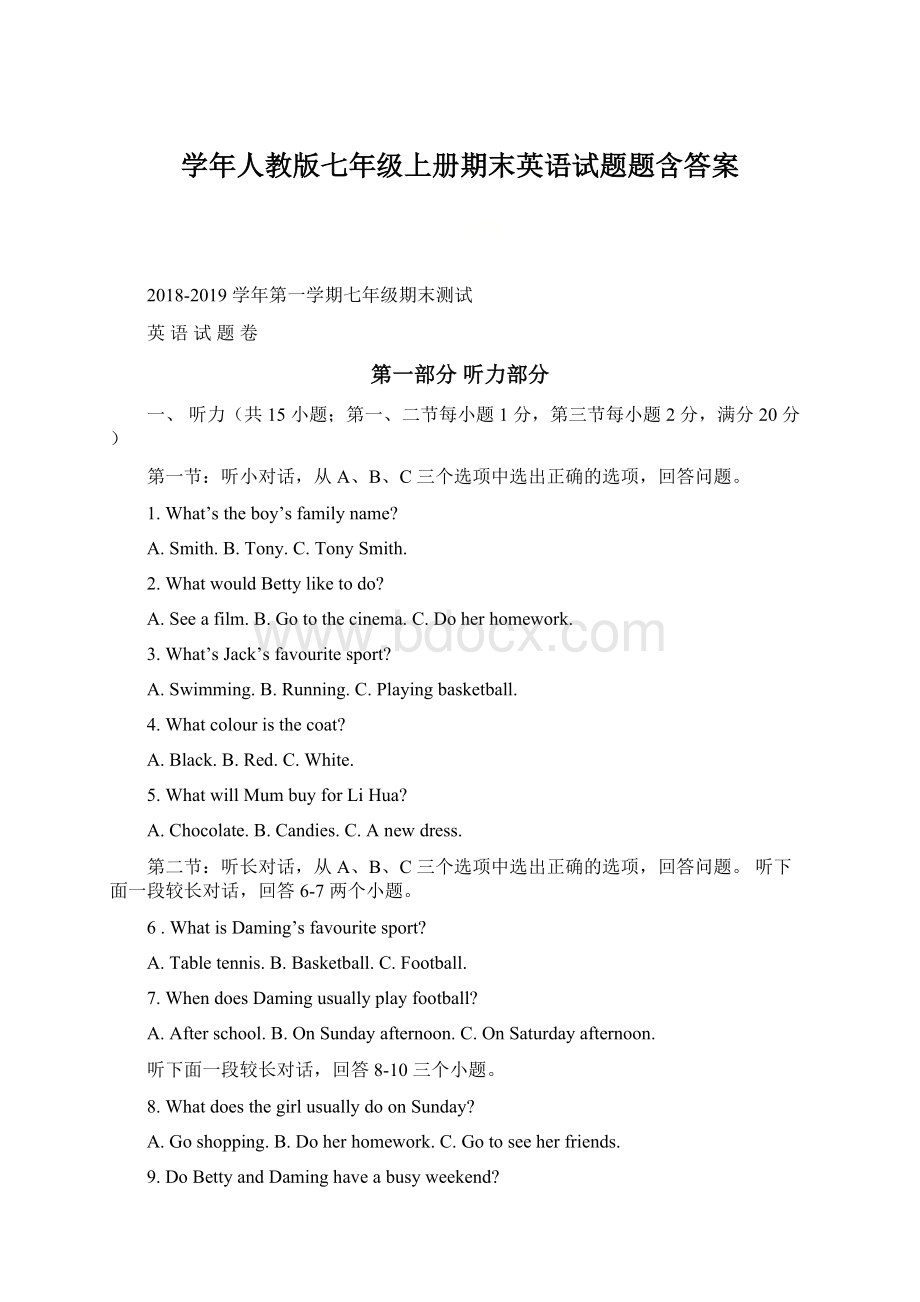学年人教版七年级上册期末英语试题题含答案.docx
《学年人教版七年级上册期末英语试题题含答案.docx》由会员分享,可在线阅读,更多相关《学年人教版七年级上册期末英语试题题含答案.docx(11页珍藏版)》请在冰豆网上搜索。

学年人教版七年级上册期末英语试题题含答案
2018-2019学年第一学期七年级期末测试
英语试题卷
第一部分听力部分
一、听力(共15小题;第一、二节每小题1分,第三节每小题2分,满分20分)
第一节:
听小对话,从A、B、C三个选项中选出正确的选项,回答问题。
1.What’stheboy’sfamilyname?
A.Smith.B.Tony.C.TonySmith.
2.WhatwouldBettyliketodo?
A.Seeafilm.B.Gotothecinema.C.Doherhomework.
3.What’sJack’sfavouritesport?
A.Swimming.B.Running.C.Playingbasketball.
4.Whatcolouristhecoat?
A.Black.B.Red.C.White.
5.WhatwillMumbuyforLiHua?
A.Chocolate.B.Candies.C.Anewdress.
第二节:
听长对话,从A、B、C三个选项中选出正确的选项,回答问题。
听下面一段较长对话,回答6-7两个小题。
6.WhatisDaming’sfavouritesport?
A.Tabletennis.B.Basketball.C.Football.
7.WhendoesDamingusuallyplayfootball?
A.Afterschool.B.OnSundayafternoon.C.OnSaturdayafternoon.
听下面一段较长对话,回答8-10三个小题。
8.WhatdoesthegirlusuallydoonSunday?
A.Goshopping.B.Doherhomework.C.Gotoseeherfriends.
9.DoBettyandDaminghaveabusyweekend?
A.No,theydon’t.B.Idon’tknow.C.Yes,theydo.
10.WhatdoDamning’sparentsdo?
A.Theyareworkers.B.Theyarebusdrivers.C.Theyareteachers.
第三节:
听下面一段独白,从A、B、C三个选项中选出正确的选项,回答下列问题。
11.WheredoesBettylivenow?
A.ShelivesinAmerica.B.ShelivesinBeijing.C.Shelivesatschool.
12.WhatareBetty’sfamilydoinginthefirstpicture?
A.Theyareeatingdumplings.
B.Theyaretakingphotos.
C.TheyarevisitingtheGreatWall.
13.WhoislearningChinese?
A.BettyislearningChinese.
B.Betty’sfatherislearningChinese
C.Betty’smotherislearningChinese
14.
Whatarethechildrendoinginthethirdpicture?
A.Theyarelearningadragondance.
B.Theyarelearningaliondance.
C.Theyaremakingdumplings.
15.HowmanypicturesdoesBettyshowtous?
A.Sheshowsusthreepictures.
B.Sheshowsusfourpictures
C.Sheshowsusfivepictures.
第二部分笔试部分
二、完形填空(共15小题;每小题1分,满分15分)
阅读下面A、B两篇短文,掌握其大意,然后从每题所给的A、B、C、D四个选项中选出最佳选项。
A
It’searlyinthemorninganditiscoolandquiet.Acrow(乌鸦)is16inabigtree.Shehasabigpieceofmeatinher17.“Mybabieswillhaveanice18”,shethinks.Anoldfoxislookingforhisbreakfast.Heseesthecrowandthemeat.“19canIgetthatpieceofmeat?
”hethinks.“Goodmorning,MrsCrow”,saysthefox,“howareyou?
”Butthecrowdoesn’t
20aword.“Ihearyourbabiesaregreat,MrsCrow”,saysthefox,“howarethey?
MayIsee
21?
”Stillthecrowdoesn’tsayaword.“Youareverybeautiful,MrsCrow.Andyouhavea
beautifulvoice(嗓子),too.”saysthefox,“Wouldyoupleasesingasong22me?
”MrsCrowthinks,“HowniceMr.Foxis!
Imustsinghimasong.”Sosheopenshermouthandbeginstosing.Atthattime,themeatdropsdown(掉下)from23mouth.
16.A.sitsB.sittingC.sitingD.sit
17.A.handB.faceC.mouthD.head
18.A.meatB.lunchC.supperD.breakfast
19.A.HowB.WhereC.WhatD.Why
20.A.sayB.speakC.talkD.tell
21.A.theyB.themC.himD.he
22.A.withB.toC.atD.for
23.A.hisB.himC.herD.sheB
SpringFestivaliscoming.Childrenalwaysenjoyitbecausetheycangetalotofpresents.Sooneofthemostimportantthings24howtochoosethepresents.Indifferentcountries,therearedifferenttaboos(禁忌).25arethoseinChina?
Chinesepeopleusuallydon'tgivea26toeachother.Aclocksounds(听起来)like
“zhong”inChinese.Itmeans“theend”.Sogivingsomeoneaclockislike27“Yourtimeisup”.Peoplewouldthinkitisnotlucky,especially(尤其是)theoldpeople.
Buyingpearsisnotagoodidea,either.Apearsounds28“li”inChinese.
Whatisasafegiftthen?
Moneyistherightanswer!
A“Hongbao”withmoneyinitisthemostpopulargiftinChina.Peoplegive“Hongbao”toshow29love.Peopleputa“lucky”amount
(数目)ofmoneyin“Hongbao”.Sixandeightarelucky30inChina.
24.A.tobeB.amC.areD.is
25.A.WhenB.WhatC.HowD.Where
26.A.watchB.clockC.bookD.glass
27.A.sayingB.talkingC.speakingD.writing
28.A.likesB.likingC.likeD.liked
29.A.yourB.ourC.myD.their
30.A.numbersB.numberC.moneyD.presents
二、阅读理解(共15小题;每小题2分,满分30分)
阅读下面四篇短文,从每题所给的A、B、C、D四个选项中选出最佳选项。
A
31.Peoplecanseethemovieon.
A.July18thB.July28thC.June18thD.June28th
32.WhendoesthemovieWolfWarriorⅡbegin?
A.At9:
30a.m.B.At9:
30p.m.C.At9:
00a.m.D.At11:
20a.m.
33.JimwantstoseethemoviewithhisfriendsLilyandLucy.Howmuchshouldtheyspendonthetickets?
A.¥25.B.¥50C.¥100.D.¥150.
B
Everyonehasafamilyname.Butdoyouknowhowtheycomeabout?
ABritishwritercalledDavidtellussomethingaboutthefamilynamesinhisnewbook.
HeshowsthatinBritainsomefamilynamescomefromplaceslikeWarwick,atowninWarwickshire.“Gatsby”comesfromthevillage(村庄)GaddesbyinLeicestershire.“Hill”isalsoaplace.
Somefamilynamescomefrompeople’sjobs.Forexample.“Butcher”meanssomeonewhosells(卖)meat.“Farmer”isamanwhohasafarm.
Interestingly,somefamilynamescomefromnickname(s
昵称).Forexample,myfamilyname
isBlack.Becauseofthedifferentcolours,somearecalledBlack,somearecalledWhite,GreenorBrown.Itissaidthatlongago,fewpeoplelivedlong.Therewerefewpeoplewithwhitehair.Whenpeoplesawsomeonewithwhitehair,theywouldcallthem“whitehead”
So,whenyouseeaBritishmanwithastrangefamilyname,don’tbesurprised(意外).There
mightbeaninterestinghistory.
34.Accordingto(根据)thebook,whatdoesthebutcherdo?
?
A.Dofarmwork.B.Cookmeals.C.Sellmeat.D.Cuthair.
35.Whichnamecomesfromaplace?
A.Hill.B.White.C.Butcher.D.Black.
36.Howmanyfamilynamesarementioned(提到)inthispassage?
A.Eight.B.Nine.C.Ten.D.Eleven.
37.Whatdoesthestorymainly(主要)talkabout?
A.Mostpeoplelivedlonginthepast(在过去).
B.“Whitehead”isnickname.
C.Wherefamilynamescomefrom.
D.Whytherearedifferentnames.
C
Manypeoplelikepets,suchasdogs,cats,birdsandsoon.SomepeoplelikemonkeysespeciallychildrenbecauseoftheChinesenovel(小说)JourneytotheWest《西游记》.WhatdoyouthinkoftheMonkeyKing?
Inthenovel,theMonkeyKing,ZhuBajieandShaSengbeatallkindsofdemons(恶魔).Theyprotect(保护)TangSengastheytraveltotheWesternParadise(西天).TheMonkeyKingwasbornfromastone.Hecanchangehimselfintoabird,ahouse,atreeorananimal.Withonesomersault(翻筋斗),hecantravel108,000li.
TheMonkeyKingisclever,brave(勇敢的)andalwaysmakesfunmagictricks.Chinesepeoplelovehimverymuch.
PeopleinothercountriesalsoliketheMonkeyKing.AfterWesternkidslearnabouthim,theyfallinlovewithhimatonceandstarttolearnkungfu.Tothem,heisasuperhero(超级英雄),justlikeSupermanandSpiderman.
38.HowmanypeopletraveltotheWesternParadiseinthestory?
A.One.B.Two.C.ThreeD.Four
39.WhatdoestheMonkeyKinglooklike?
A.Amonkey.B.Apet.C.Astone.D.Abird.
40.WhatdoyouthinkoftheMonkeyKing?
Whichisnotright?
A.Heisclever.B.Heislazy.C.Heisbrave.D.Heisfunny.
41.Theunderlined(划线的)word“beat”means“”inChinese.
A.跳动B.敲打C.节奏D.打败
D
Davidisgoodatdrawingcartoons(卡通).DoyouknowhisbookAbirdwithabeautifulvoice(嗓音)?
Thebookisaboutamanandabird.Themanhasnofamilyandalwaysfeelslonely(寂寞).Oneday,hewalksbyapetshop,andhearsthebirdsingingbeautifully.Helooksatthebirdandfindsitislovely.HebuysthebirdandcallsitPolly.Polly’ssingingmakeshimhappy.Helikesit
verymuch.Onenight,hehasadream(梦).Hebecomes(变成)abirdlikePolly.Hecanflywith
Pollyhappily.Suddenly,themanfindshimselfinacage(笼子).Hecan’tgetout.Hejustkeepsjumpingupanddownlookingoutofthecage.
Thenextday,hewakesup.Helooksatthebirdagain.Thelovelybirdisstillsinging.Butheknowsitisnotfreeorhappyinhishome.Thenthemanopensthecage,andthebirdfliesaway.
So,ifyoulovesomeone,sethimfree(让他自由).
42.Abirdwithabeautifulvoiceisa.
A.nicefilmB.TVshowC.cartoonbookD.sciencebook
43.Whydoesthemanbuyabird?
A.Becausehewantstosaveit.B.Becausethebirdcanmakehimdream.
C.Becausehewantstoeatit.D.Becausehefeelslonely.
44.Whereisthemaninhisdream?
A.Inacage.B.Inabox.C.Inthesky.D.Inthebed
45.Whatisthebesttitleforthispassage?
A.David’scartoons.B.Setlovefree.
C.AmanandabirdD.Aninterestingbird.
四、词汇运用(共15小题;每小题1分,满分15分)
A.用方框中所给词语的适当形式填空。
每词限用一次
46.Tonyalwayslikesbirthday.
47.Mymothertakessomeeveryday,sosheisingoodhealth.
48.TheelephantfromAfrica.
49.Thegiraffeeatsgrassandotherplantsleaves.
50.Hurryup,there’stime.
B.根据短文内容和所给中文提示,在空白处写出单词的正确形式。
每空限填一词。
DoyouknowDonghuPark?
It’s51(一个)ofthemostinterestingandbeautifulparksinourcity.Inthemiddleofthepark,thereisabiglake(湖)52(有)lovelyfish.Therearefour
53(季节)here.Theweatherinspringandautumnisreallynice.Andthereare54(许多)treesandflowers.Hereisapictureofthepark.Thetrees55(是)tallandgreenalltheyearround.Someleavesturnyelloworredinautumn.Thebirdsenjoy56(唱歌)inthetrees.The
flowersareindifferent57(颜色),suchasred,white,yellow,pinkandsoon.Wecanseealotof58(孩子)playingthere.Somearedancing.Someare59(坐)bythelake.Someareswimming.Theyarehavingagoodtime.60(多么)abeautifulpicture!
五、语法填空(共10小题;每小题1分,满分10分)
阅读下面短文,按照句子结构的语法性和上下文连贯的要求,在空白处填入一个适当的
词,或填入括号中单词的正确形式。
Wealwaysenjoyallkindsoffestivalsverymuch61theyalwaysbring(带来)ushappiness.62NewYear’sDay,manypeopleeatspecialfoodforgood63(lucky).InSpainandsomeLatinAmericancountries,peopleeattwelvegrapes64midnightonNewYear’sEve—on